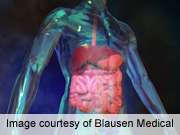Rebleeds common post-capsule endoscopy for obscure GI bleeds

(HealthDay)—Nearly one-third of patients who undergo capsule endoscopy (CE) for obscure gastrointestinal bleeding (OGIB) have rebleeding a year or more later, according to research published online Dec. 15 in the Journal of Digestive Diseases.
Wei Tan, of the Shanghai Jiaotong University School of Medicine, and colleagues conducted a retrospective study of 372 consecutive patients who underwent CE for OGIB from June 2002 to January 2012. Long-term outcomes and risk factors associated with rebleeding were examined.
The researchers found that rebleeding occurred in 28.6 percent of patients at 12 to 112 months after CE (median, 48 months). According to multivariate analysis, CE positive findings (hazard ratio [HR], 3.393; 95 percent confidence interval [CI], 1.931 to 5.963); anticoagulants, antiplatelet, or nonsteroidal anti-inflammatory drug use after CE (HR, 2.851; 95 percent CI, 1.433 to 5.674); nonspecific treatments (HR, 2.5; 95 percent CI, 1.625 to 3.848); age ≥60 years (HR, 2.473; 95 percent CI, 1.576 to 3.881); and hemoglobin levels ≤7g/dL before CE (HR, 2.01; 95 percent CI, 1.261 to 3.206) were independently associated with risk of rebleeding. In univariate analysis, chronic hepatitis was independently associated with rebleeding in patients with negative findings on CE.
"Further investigation and close follow-up in patients with OGIB and CE negative patients is necessary," the authors write.
More information:
Abstract
Full Text (subscription or payment may be required)
Copyright © 2014 HealthDay. All rights reserved.



















